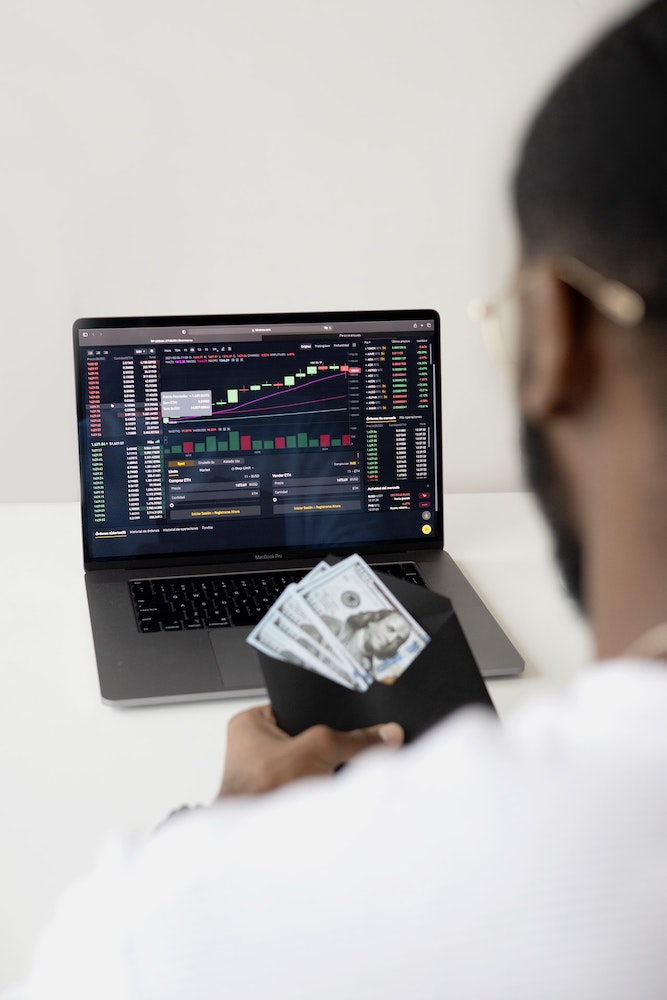To be able to trade for a living is a dream of financial independence for many. However, one statistic is always thrown in your face: 95% of retail forex traders lose money. So what’s the deal? Is it possible to make a living trading forex or not?
Can you make a living trading forex?
You can make a living trading forex. Like any other business, it requires learning, dedication, hard work, and in the case of the financial markets, a whole lot of blood, sweat, and tears.
Professional traders did not start trading for a living overnight: ask nearly anyone and they’ll tell you they’ve been through a long and painful journey with at least one or two blown accounts.
So if trading is such a heartache, why do people keep coming back to it?
What makes trading so appealing?
The beauty of trading is that your potential returns are directly proportional to how much capital you are able to put in.
A single trade of 10 pips can be worth $1, $10, $1000, $10,000, or even $100,000.
The idea is that once you’ve gotten your strategy down and your psychology under control, and your money management rules in place, the sky is really the limit for how much money you can make.
Read more: 20 pips a day challenge

Disadvantages of trading
Everything’s not all roses, though. Contrary to what some online gurus promise, mastering trading is a long journey. You will lose money, you will feel like bashing in your computer screen, and there will be times that you want to give up.
Even the best traders in the world have losing streaks, and seeing so much money just disappear can have a very severe toll on your mental health.
All that stress can compound and lead to further poor trading decisions, and the next thing you know, you’ve blown your account thanks to taking on too much risk.
The line between trading as a business and trading to gamble is very fine indeed, and even the best traders see themsleves toeing the line every so often.
A trading career is attainable for anyone, but you really have to master yourself and your psychology before you can get there.
How long does it take to become a successful trader?
Many traders are able to see success in a short amount of time, while others take years before they become experienced traders.
There’s no fixed amount of time that will guarantee success, and past performance is no guarantee of future success.
However, you’ll become a successful trader once you learn to master your own emotions, understand probabilities, and use those to your advantage.
It doesn’t matter if you’re a swing trader, a position trader, or a scalper: the time it takes for you to master your own mindset and psychology is how long it’ll take to become a successful trader.
Also, the longer you’ve been trading for, the more experience you’ll have. You’ll start to understand how certain currency pairs move, what their nuances are, and you’ll even be able to identify certain setups that repeat themselves.
Related: Will Forex trading last forever?
Developing your strategy and edge
Most traders utilize some form of technical analysis and chart patterns to trade. If you’re a day trader, you’re probably going to be in trades for the very short term, even if you’re swing trading, so it’s unlikely that you’ll utilize much long-term fundamental analysis.
Once you have an idea about the basics of technical analysis such as support and resistance, trends, ranges, indicators, and the like, you can start formulating a trading strategy and testing it on a demo account.
You must assume that only 50% of your trades will be winners(in line with the law of probability), so your strategy must be designed in a way to remain profitable even if you only win half of your trades.
This could be as simple as taking trades that have the potential of at least twice what you risk with your stop loss, so even if you lose half your trades, you’re still net positive.
Of course, finding a strategy is the easy part: there are tons of free strategies that you can find on YouTube and even paid strategies that you can get from online courses.
The key to developing your edge is to master your trading psychology: learn to walk away from the charts on a bad day, and never break your rules, no matter how tempted you may be.
Learning risk management
Risk management is the single most important part of your trading journey. Forex brokers will happily over-leverage you on your trades, setting you up for losing money if you don’t know what you’re doing.
There’s no fixed amount that you should risk per trade, though most common wisdom agrees that it should be between 1-3% of your capital.
Ideally, you want to target making more money per trade than you risk, so your risk-to-reward ratio should be at least 1:2 or 1:3.
Because forex trading is all about probability, you need to skew the probability in your favor in order to stay profitable.
You can calculate your lots per trade depending on your risk to reward ratio. For example, if you have $5,000 in your account and your plan is to risk 2% per trade, that’s $100.
If the setup you’re trading requires a 100 pip stop loss, you can take a 0.1 lot trade.
The most important part of trading is sticking to a good risk management plan.
Trading your own capital
In order to make a living trading forex, you need capital. In order to figure out if trading can pay your bills, you need to write out what your monthly expenses are.
If your monthly expenses are $2000 per month, that’s how much you need to make per month just to make ends meet.
Assuming you can make 5% per month on your account, you’d need to have a $40,000 account to get that much.
Of course, that’s if you can consistently make 5% per month.
Many people may think that if they had $40,000 in the bank that they were willing to lose, they wouldn’t look to replace their current income with something that makes $2,000 per month!
Trading someone else’s capital
Prop trading desks have been around for a long time, but online prop firms have only recently started popping up.
These firms make large chunks of capital accessible to aspiring day traders and experienced traders who don’t have a lot of money to trade.
If you can pass a prop firm challenge, you can potentially make enough money to supplement and eventually replace your day job income.
Instead of having to pitch investors and find capital on your own, prop firms are willing to give you access to tens of thousands of dollars to trade for them.
Of course, you need to have trading experience under your belt and demonstrate profitability before you can take a prop firm challenge and get funded, but it’s definitely possible.
However, be careful when taking challenges. They have a certain gambling-like appeal to them and you can find yourself sinking a significant amount of money into them only to keep failing.
Is depending solely on trading profits a good idea?
The appeal of being your own boss and starting your day trading career is very enticing, but trading psychology is incredibly hard to master, especially if the money you expect to earn from trading is money that you’re depending on to pay the bills.
The pull of the market to try and take too many trades is just too strong, and it will probably take years and years of practice before you master the self control required to stay profitable when trading.
You can have a killer strategy, but if you lack the discipline, you’ll blow an account sooner than you can say the word “pip.”
That’s why it’s better to utilize forex as a longer-term wealth generating strategy instead of relying on it to make a living.
There will be days when you either lose a lot of trades, or days where you just don’t get trades, and during those times, it will be very tempting to break your trading rules and try to jump into the market.
BAD IDEA.
Forex is a long term game, and you need to let your edge play out over time.
There are some traders out there who have developed a really keen eye for the market and can day trade very successfully, and you can get there too. You just need to give yourself time.
Related: Best times to trade Forex
Why do day traders lose money?
The statistics for retail traders are very bleak. Some say that 90% of traders lose money, and others say that 95% lose money.
Incidentally, that’s why a prop firm decided to label themselves as the 5%ers, meaning they represent the 5% of traders that actually make money!
Day traders and retail traders usually lose money because of three things:
They get greedy
The constant movements of the forex market make it very tempting to try to catch every candle and become a millionaire overnight.
However, trying to catch every candle will inevitably result in a shit ton of losing trades since you’ll just try to dive in willy nilly without having a concrete trading plan.
They don’t have a trading plan
If you fail to plan, you plan to fail. You must have a documented set of trading rules that dictate how you will enter the market and how you will exit.
It should also document your risk management strategy and how you can reduce your risk in case a position turns against you.
They don’t follow their trading plan
One more reason traders fail is because they have trading plans, but they don’t follow them! The market is one hell of a temptress, so you have to master your worst instincts and fears and be in it for the long run in order to make this work!
Conclusion
It’s possible to make a living through forex trading. Make sure to use a demo account or a trading simulator for at least two to three months before trying to trade a live account, and you will be on your way to financial freedom.
Remember: trading forex is a long game, not a get-rich-quick scheme.
